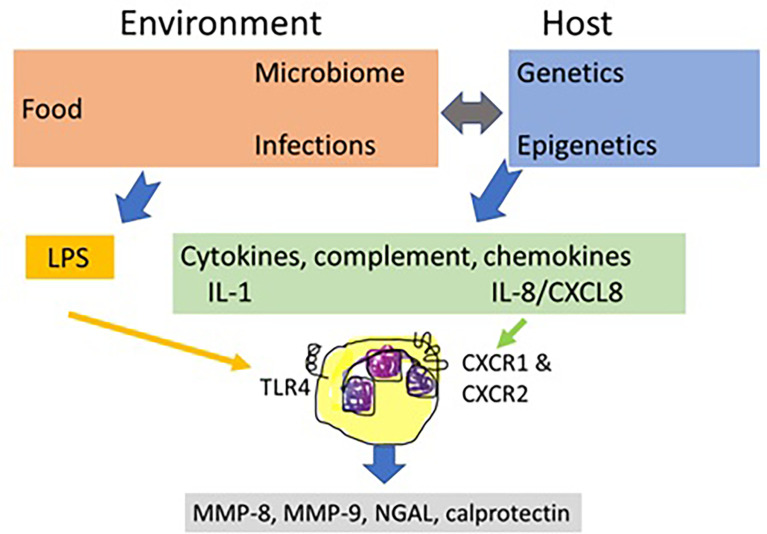Figure 2.
The central role of neutrophils in inflammatory bowel disease. Inflammatory bowel disease (IBD) biology is determined by host genetics and epigenetics and by environmental factors, including food, gut microorganisms and medication. Under balanced physiological conditions and under derailed conditions of infections and inflammations, these elements determine the control functions by the immune system. Neutrophils are critical cells in IBD biology. They respond to both environmental and host factors and play a central role by regulated release of MMPs and other granular contents. In IBD, the most prominent environmental factor is diet that influences the intestinal microbiome and, reciprocally, gut bacteria help with food processing and resorption. Dysregulations of the gut microbiome, occurring by infections, medication, food and by host factors, damage the intestinal barrier, enabling endotoxins or lipopolysaccharides (LPS) to seep across the damaged mucosal barrier. LPS directly activates local neutrophils through toll-like receptor 4 (TLR4) to degranulate and is also a key factor for indirectly modulating immune responses at various levels. IBD susceptibility, determined by host genetics and epigenetics (food, microbiota, medication, see double grey arrow) leads to inflammation with the production of immune mediators, including cytokines (e.g. IL-1 and TNF), complement factors (e.g. C3a and C5a) and chemokines, such as IL-8/CXCL8. Through their cognate receptors, for instance CXC chemokine receptor 1 (CXCR1) and CXCR2 for IL-8/CXCL8, these molecules also stimulate the release of neutrophil mediators. MMP-8 as a neutrophil collagenase clips and thereby denatures basement membrane and mucosal collagens. MMP-9 further digests denatured collagens and has many additional structural and functional substrates in the intestinal mucosa, including IL-8/CXCL8 and tight junction components. Aside MMP-8 and MMP-9, other neutrophil products, namely calprotectin and NGAL are additional biomarkers for the presence of neutrophil involvement in IBD, and these may all be detected in faeces samples.

